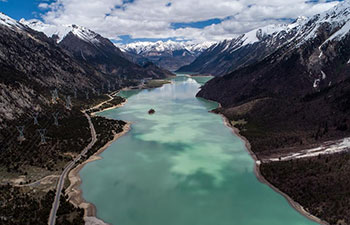JERUSALEM, Aug. 4 (Xinhua) -- Researchers from Israel, China, the United States and Switzerland have found that water accumulated in an ancient aquifer in the south part of the Israel is 360,000 years old, the Weizmann Institute of Science (WIS), located in central Israel, reported on Sunday.
The findings, published in the journal Proceedings of the National Academy of Sciences (PNAS), help expose global climate change processes.
The research team examined rainwater accumulated hundreds of meters underground in Israel's Negev Desert (one of the most arid regions in the world today) - in an era when the region was less hot and humid.
Such desert reservoirs, called "fossil aquifers," are not replenished because the climate in the area has become much less humid and wet over the years.
The Negev aquifer contains several hundred cubic kilometers of water, and is the main source of water for settlements in the region.
So far, attempts to date the reservoir's formation have indicated an incorrect age of 30,000 years, due to an inaccurate method, measuring the carbon-14 radioactive isotope in the water.
In the current study, the researchers used a new method, measuring the radioactive isotope krypton-81 of the krypton noble gas.
Unlike carbon, the krypton element is rare in the Earth's crust and cannot penetrate the groundwater from the rocks adjacent to it, thus polluting the measurement.
This way it was revealed that the water source is from two humid periods: one about 360,000 years ago and the other 20,000-30,000 years ago.
The data also revealed that during the earlier humid period, the source of water was clouds that developed over the tropical Atlantic Ocean - unlike the few rain clouds that reach the area today, formed over the Mediterranean Sea.
The cloud source of the second humid period is probably from the Mediterranean, when the wind system drove clouds further south than it does today.
In these periods the Earth's orbit around the sun was more circular (low orbital eccentricity), compared to other periods when it became slightly more elliptical.
These changes occur because of changes in the gravitational forces exerted by other solar system planets on Earth, and they have been linked to the cyclic ice periods.
Thus, the study shed further light on the broad relationship between minor changes in the Earth's orbit and major climate changes.
The study team included researchers from Israel's Ben Gurion University and the Hebrew University of Jerusalem, the Geological Survey of Israel, the University of Science and Technology of China located in the city of Hefei, The University of Chicago, the Argonne National Laboratory in Lemont, Illinois, and Switzerland's University of Bern.

















